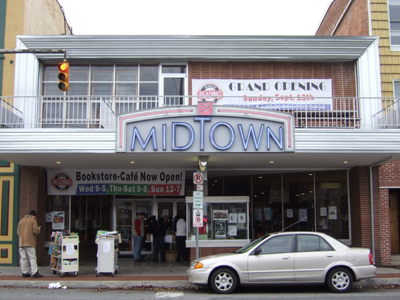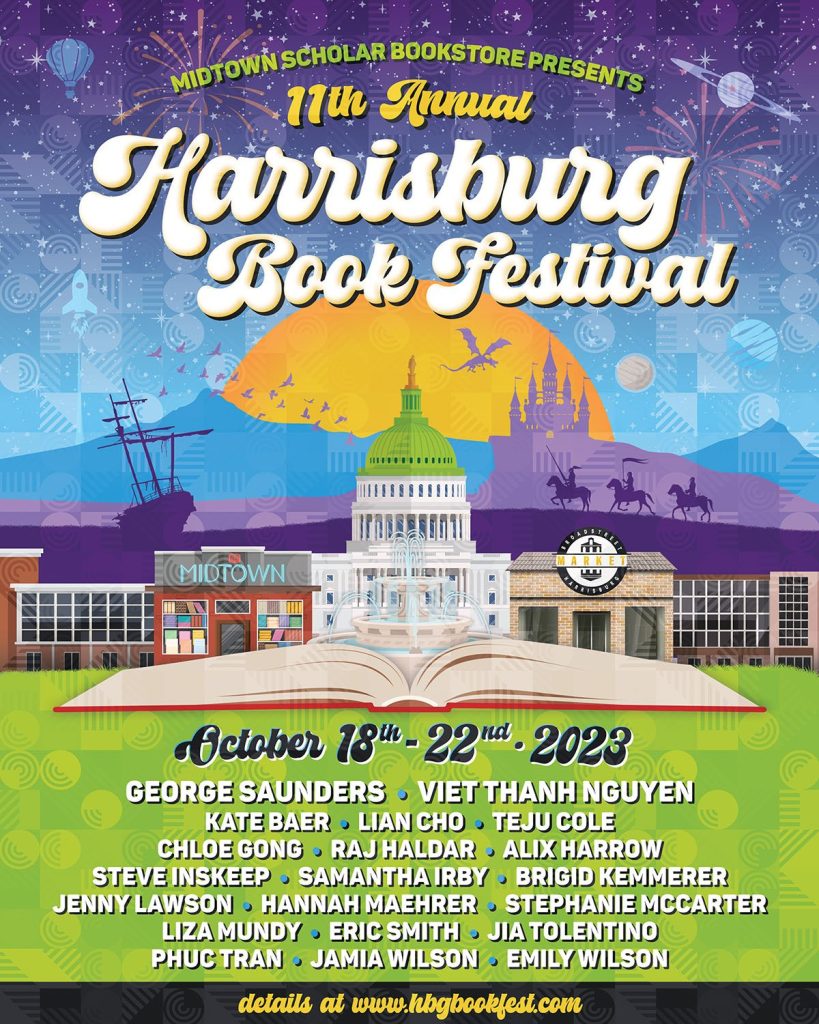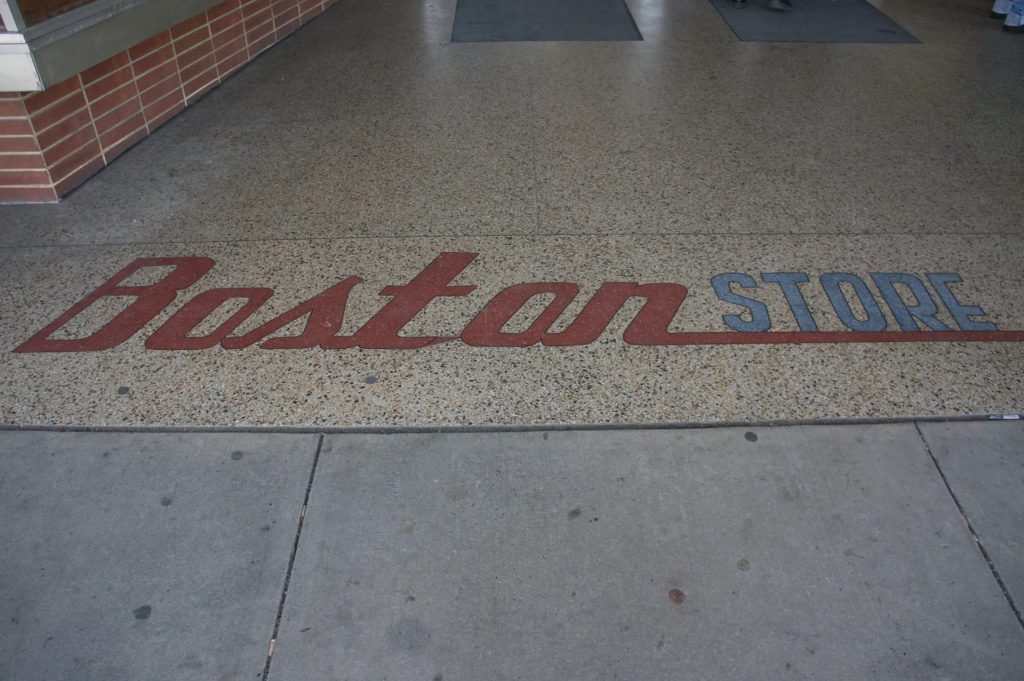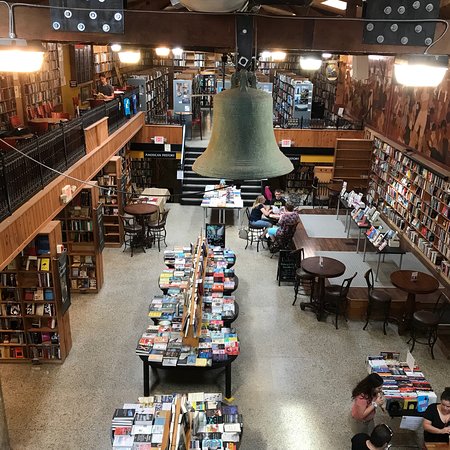Midtown Scholar: A History of Community Engagement
Midtown Scholar resides in the heart of Midtown Harrisburg, which is an area of rich history and diversity.
The Story of Midtown
Midtown Scholar Bookstore is in the Midtown neighborhood of Harrisburg, which is nestled between Downtown and Uptown. The neighborhood’s southern border is Forster Street, with Maclay Street to the north, 7th Street to the east, and the Susquehanna River to the west (“Districts”). Prior to the 1970’s, the area was marked by economic struggle and building vacancies. However, in 1977, the Midtown Square Action Council was created to improve the community’s interests, and they began popularizing the name Midtown. Between 1980 and 2000, the neighborhood began to improve economically, with the median income increasing from today’s $30,000 to $40,000. Additionally, the age of the population fell to over half of the residents being below the age of 35. The population also became more racially and ethnically diverse, with the majority of residents being Black or African American (Stabert).

Image taken from Publishers Weekly
Due to its close proximity to the state capital, many young professionals were drawn to this neighborhood. Over the years, new businesses drew people to Midtown with unique forms of entertainment and satisfying restaurant options. Oddly enough, many of these fan favorites dawn the name ‘Midtown’ into their titles. Aside from Midtown Scholar, Midtown Cinema opened around the same time to provide locals with both mainstream movies and lesser-known foreign films. There are also places like Midtown Tavern that adopted the name following the neighborhood’s newfound popularity.
Today, the demographics of this area have remained relatively stagnant with a primarily Black or African American population of young people around the age of 30. These residents have a median income of about $44,444, which is not far from the numbers during their growth period from 1980 to 2000.
The Birth of an Online Business
Our story starts with two young intellectuals named Eric Papenfuse and Catherine Lawrence who met while in graduate school at Yale University. Their love story was built on a love for books, and they spent most weekends scouring bookstores for their next favorite read. However, upon their graduation from Yale, the couple relocated to the Harrisburg area. The year was 1999 and both Papenfuse and Lawrence had secured teaching positions in the area, with her working at Messiah College and him teaching Latin temporarily at Central Dauphin High School (Bedell and Landesberg).
Once they found a house, the couple quickly realized they did not have much use for their collection of 100 to 150 university textbooks; and they certainly did not have the storage space for them. To solve this debacle, Papenfuse began selling his used books online at Amazon.com. Many of his books sold quickly, which convinced him there may be a market online for used books, especially academic ones. By January 2001, Papenfuse was selling books online from the comfort of his home in the Shipoke neighborhood (Bedell and Landesberg).
In terms of book selling, academic texts are generally always in high demand. This is because students have no control over what books are required for a course, that is entirely up to the professor’s discretion. Therefore, the sellers of these texts can mark university textbooks at alarmingly high prices because students will always need to buy them. This is where used academic book selling comes in handy because they are usually discounted compared to brand new copies, thus appealing to lower income college students. Papenfuse was able to profit from this need by curating a stock of used books that him and Lawrence acquired from local bookstores, library sales, and university presses. University presses proved to be very useful for the creation of their business because these types of publishers tend to print fewer copies than larger publishing houses. Therefore, by building strong relationships with these presses Papenfuse and Lawrence were able to have a steady flow of material to offer their customers (Bedell and Landesberg).
Becoming a Physical Place
As time passed and their business grew, Papenfuse and Lawrence realized their house in Shipoke could no longer withstand the steady influx of inventory. So, in 2002 they bought and began renovating the old Midtown Post Office building at 1519 N. Third Street, which became the first physical address for Midtown Scholar. Once they centralized their business in Midtown, the couple made it a point to cater their inventory to the community they were serving. Since the area was booming with diverse, young professionals, they stocked books dedicated to arts, photography, urban affairs, and African American studies (Bedell and Landesberg). This is a policy that Midtown Scholar has held onto since its inception. According to the store’s mission statement, they have “worked to transform our community by providing a welcoming space for the discussion and exchange of ideas about books, politics, arts and culture, and history (“About Us”).
Midtown Scholar found itself in a constant cycle of growth that was marked by the ever-present need to purchase new spaces. Over the years, Papenfuse and Lawrence have bought and rented several storage units and buildings to house their constantly growing collection of products. Eventually, they were forced to close their original 3,000-square-foot building to expand down the street to a 10,000-square-foot space. On September 13, 2009, they reopened at 1302 N. Third Street. This new space allowed them to carry around 100,000 volumes, a café, a stage for author events and musical performances, and an art gallery (Bedell and Landesberg).

Taken from Midtown Scholar Bookstore
Engaging the Community
These new additions to Midtown Scholar allowed them to better serve their community by bringing interesting events to their doorstep. The store has hosted a slew of famous authors, like Frederick Backman and Erik Larson. However, arguably the largest way Midtown Scholar has continued to uplift its area is through the creation of the Harrisburg Book Festival, which Papenfuse and Lawrence launched in 2009. Although the project started small, it has grown into a book-themed spectacle that celebrates all things literature with a weeklong schedule of panels, author events, book signings, and children’s programs (Beeck).
The success of Midtown Scholar as a community cornerstone can be marked by Papenfuse’s political career. He served as the mayor of Harrisburg from 2014 to 2022 and calls his bookstore “a place for civic engagement and a catalyst for urban development” (Beeck).
Preserving the History
The city of Harrisburg and the Midtown neighborhood are both packed with examples of 19th and 20th century architecture, and Midtown Scholar is no different. In the current store, Papenfuse and Lawrence have made it a point to keep much of the original architecture from the former theatre and department store to honor the community’s history. For example, a portion of the original 1897 department store’s decal, the Boston Store, can be seen inside Midtown Scholar (Bassert).

Another example of Midtown Scholar’s historical preservations is the ornate bell that hangs from its ceiling, which is sometimes rung for special occasions. When Papenfuse was first elected, the sound of the bell tolling could be heard throughout Midtown (Bassert).
The Motives of Midtown Scholar
Midtown Scholar’s dedication to fostering civic engagement and promoting free thinking made me immediately think of Archibald MacLeish’s assertions about books in “A Free Man’s Books”, particularly his claim that books are weapons. He specifically described books as “weapons of such edge and weight and power that those who would destroy the world of freedom must first destroy the books that freedom fights with” (MacLeish 6). Midtown Scholar’s mission statement, mentioned above, inadvertently acknowledges the fact that books generally have agendas, and these agendas can impact how a person thinks or acts. This is done by focusing on ideas surrounding politics and culture and promoting these ideas within their inventory by shelving titles that feature African American studies and political engagement.

However, as I ponder the agenda of Midtown Scholar, I cannot help noticing that these are white booksellers serving a predominantly Black community. Papenfuse and Lawrence realize their store is in a diverse area because they make it a point to stock up on books that focus on diversity. This then led me to considering Joshua Clark Davis’ claims in “Liberation Through Literacy.” During this piece, Davis explains that once Black and African American literature gained popularity in America, chain stores and white booksellers began selling these titles for cheaper prices than Black booksellers to make an easy profit (Davis 67). This forced many Black bookstores out of business, which made me consider Midtown Scholar’s dedication to Black literature. Are they just trying to give their community the content that best reflects their identities? Or are they attempting to make a profit off their diverse community? There’s no way to know the answer to this, but it does make me wonder if a Black-owned bookstore opened in Midtown, would it give Midtown Scholar a run for their money?
Works Cited
“About Us.” Midtown Scholar Bookstore-Cafe, 2023, www.midtownscholar.com/history-and-mission.
Bassart, Lauren. “Why Everyone Should Visit Midtown Scholar Bookstore in Harrisburg, PA.” The Constant Rambler., 30 July 2014, www.theconstantrambler.com/midtown-scholar-bookstore-harrisburg-pa/.
Bedell, Doug, and Phil Landesberg. “Midtown Scholar Bookstore Owners Cover Business on Internet, in Shop.” ProQuest, Central Penn Business Journal, 6 Apr. 2007, libgateway.susqu.edu/login?url=https%3A%2F%2Fwww.proquest.com%2Ftrade-journals%2Fmidtown-scholar-bookstore-owners-cover-business%2Fdocview%2F236300397%2Fse-2%3Faccountid.
Beeck, Nathalie op de. “U.S. Book Show 2023: Midtown Scholar.” PublishersWeekly.Com, Publishers Weekly, 12 May 2023, www.publishersweekly.com/pw/by-topic/industry-news/bea/article/92294-u-s-book-show-2023-midtown-scholar.html#:~:text=They%20entered%20the%20bricks%2Dand,bookstores%20in%20Cambridge%20or%20Georgetown%2C.
Davis, John Clark. “Liberation Through Literacy .” From Head Shops to Whole Foods: The Rise and Fall of Activist Entrepreneurs , p. 67.
“Districts.” Explore HBG, www.explorehbg.com/neighborhoods/#:~:text=Midtown%20Harrisburg%20is%20delineated%20by,Susquehanna%20River%20to%20the%20west. Accessed 8 Oct. 2023.
MacLeish , Archibald. A Free Man’s Book.
Stabert, Lee. “Rebirth in Midtown Harrisburg.” Keystone Edge – What’s Next & Best in Pennsylvania – Growth, Innovation, and Community News, 17 May 2016, www.keystoneedge.com/2016/05/17/rebirth-in-midtown-harrisburg/.
Veronikis, Eric. “Midtown Scholar Set to Reopen in Bigger Space.” ProQuest, Central Penn Business Journal , 21 Aug. 2009, libgateway.susqu.edu/login?url=https%3A%2F%2Fwww.proquest.com%2Ftrade-journals%2Fmidtown-scholar-set-reopen-bigger-space%2Fdocview%2F236378901%2Fse-2%3Faccountid.

0 Comments